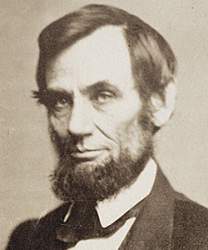Record Data
Source citation
Abraham Lincoln to Agenor-Etienne de Gasparin, August 4, 1862, in Roy P. Basler, ed., The Collected Works of Abraham Lincoln (8 vols., New Brunswick, NJ: Rutgers University Press, 1953), 5: 356-357, http://quod.lib.umich.edu/l/lincoln/.
Recipient (to)
Agenor-Etienne de Gasparin
Type
Miscellaneous
Date Certainty
Exact
Transcriber
Transcription adapted from The Collected Works of Abraham Lincoln (1953), edited by Roy P. Basler
Adapted by Matthew Pinsker, Dickinson College
Transcription date
Transcription
The following text is presented here in complete form, as it originally appeared in print. Spelling and typographical errors have been preserved as in the original.
Letter to Agenor-Etienne de Gasparin (August 4, 1862)
Executive Mansion Washington August 4. 1862
Dear Sir:
Your very acceptable letter dated Orbe Canton de Vaud, Switzerland 18th of July 1862 is received. The moral effect was the worst of the affair before Richmond; and that has run its course downward; we are now at a stand, and shall soon be rising again, as we hope. I believe it is true that in men and material, the enemy suffered more than we, in that series of conflicts; while it is certain he is less able to bear it.
With us every soldier is a man of character and must be treated with more consideration than is customary in Europe. Hence our great army for slighter causes than could have prevailed there has dwindled rapidly, bringing the necessity for a new call, earlier than was anticipated. We shall easily obtain the new levy, however. Be not alarmed if you shall learn that we shall have resorted to a draft for part of this. It seems strange, even to me, but it is true, that the Government is now pressed to this course by a popular demand. Thousands who wish not to personally enter the service are nevertheless anxious to pay and send substitutes, provided they can have assurance that unwilling persons similarly situated will be compelled to do like wise. Besides this, volunteers mostly choose to enter newly forming regiments, while drafted men can be sent to fill up the old ones, wherein, man for man, they are quite doubly as valuable.
You ask “why is it that the North with her great armies, so often is found, with inferiority of numbers, face to face with the armies of the South?” While I painfully know the fact, a military man, which I am not, would better answer the question. The fact I know, has not been overlooked; and I suppose the cause of its continuance lies mainly in the other facts that the enemy holds the interior, and we the exterior lines; and that we operate where the people convey information to the enemy, while he operates where they convey none to us.
I have received the volume and letter which you did me the honor of addressing to me, and for which please accept my sincere thanks. You are much admired in America for the ability of your writings, and much loved for your generosity to us, and your devotion to liberal principles generally.
You are quite right, as to the importance to us, for its bearing upon Europe, that we should achieve military successes; and the same is true for us at home as well as abroad. Yet it seems unreasonable that a series of successes, extending through half-a-year and clearing more than a hundred thousand square miles of country, should help us so little, while a single half-defeat should hurt us so much. But let us be patient.
I am very happy to know that my course has not conflicted with your judgement, of propriety and policy.
I can only say that I have acted upon my best convictions without selfishness or malice, and that by the help of God, I shall continue to do so.
Please be assured of my highest respect and esteem.


